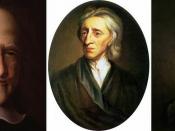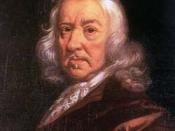Thomas Hobbes and John Locke are often referred to as the premier liberal philosophers, a label which is actually misleading. The political philosophies of Hobbes and Locke are only similar in their methodology, not in their conclusions or in the form of government they advocate. In fact, the ideologies of Hobbes and Locke are so dissimilar they should not even be counted in the same category. Hobbes and Locke both begin with a theoretical "state of nature," which they use to explain how and why governments are formed and what purpose they should serve. This leads many people to place them in the same category of thought, even though the basic structure of their respective states of nature are very different from one another, and the conclusions they draw from these theoretical states are wholly different. Liberals are characterized by their belief that humans are rational, self-interested beings, and by their desire for a new form of government in which all people are free to pursue their own individual interests.
John Locke should be considered the real liberal, because he is the only one of these two writers to truly believe in the rationality of all men, and he is the only one to advocate upholding individual freedoms above all else.
A major tenet of liberal philosophy is the belief that men are inherently rational. Thomas Hobbes claims to believe that men are rational beings, yet his writing on the subject is so full of contradictions that it is difficult to discern what he actually believes. In Hobbes' state of nature, men are in a constant state of war. He describes this state in The Leviathan as a state of "continual fear, and danger of a violent death; and the life of man, solitary, poor, nasty, brutish, and short. (Ball...


